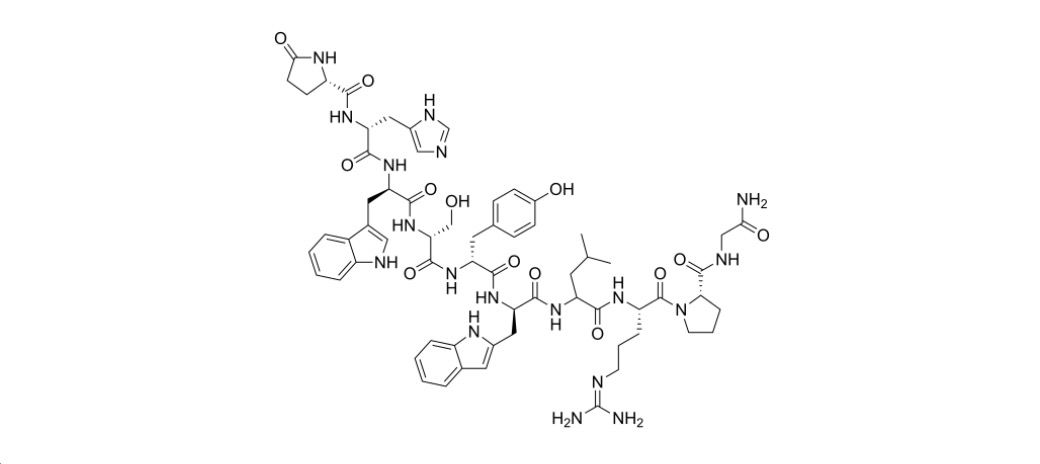Triptorelin

Overview
Triptorelin is a synthetic decapeptide analogue of gonadotropin-releasing hormone (GnRH), functioning as a potent inhibitor of gonadotropin secretion. It is primarily utilized in the management of hormone-dependent conditions, including advanced prostate cancer and central precocious puberty. By modulating the release of luteinizing hormone (LH) and follicle-stimulating hormone (FSH), triptorelin effectively reduces the production of sex hormones, thereby controlling disease progression and symptoms associated with these conditions.
Background and Date of Approval
Triptorelin was first approved for medical use in 1986 and has since been marketed under various brand names, including Decapeptyl, Trelstar, and Triptodur. It is included in the World Health Organization’s List of Essential Medicines, highlighting its significance in medical practice. The drug’s approval was based on clinical trials demonstrating its efficacy in reducing testosterone levels in men with prostate cancer and in suppressing premature puberty in children.
Uses
Triptorelin is indicated for the palliative treatment of advanced prostate cancer in men. It is also used to treat central precocious puberty in children, a condition characterized by early onset of puberty. Additionally, triptorelin has applications in assisted reproduction technologies, where it is employed to prevent premature ovulation during in vitro fertilization procedures. The drug’s ability to suppress gonadotropin secretion makes it a valuable therapeutic agent in these clinical scenarios.
Administration
Triptorelin is administered via intramuscular injection. The dosing regimen varies depending on the specific indication and the desired duration of action. For prostate cancer, the recommended dosing schedules include 3.75 mg every 4 weeks, 11.25 mg every 12 weeks, or 22.5 mg every 24 weeks. For the treatment of central precocious puberty, dosing is typically initiated at 3.75 mg every 4 weeks, with adjustments based on clinical response and patient age. It is crucial to follow the prescribed dosing schedule to achieve optimal therapeutic outcomes.
Side Effects
Common side effects of triptorelin include hot flashes, headache, fatigue, and injection site reactions such as pain, redness, or swelling. These side effects are generally transient and may subside with continued therapy. Patients should be monitored for any adverse reactions, and supportive measures should be implemented as necessary to alleviate symptoms.
Warnings
Serious adverse events associated with triptorelin include anaphylactic reactions, cardiovascular events such as myocardial infarction and stroke, and metabolic disturbances like hyperglycemia. The drug may also cause alterations in bone mineral density with long-term use. Patients should be closely monitored for these potential complications, and appropriate interventions should be initiated promptly if adverse events occur.
Precautions
Before initiating triptorelin therapy, a thorough assessment of the patient’s medical history is essential, particularly concerning cardiovascular health and metabolic status. Concomitant use of other medications that may affect blood glucose levels or cardiovascular function should be approached with caution. Regular monitoring of blood glucose levels, lipid profiles, and cardiovascular status is recommended during treatment with triptorelin.
Expert Tips
Prescribers should ensure that patients are adequately informed about the potential side effects of triptorelin and the importance of adhering to the prescribed dosing schedule. Pharmacists should counsel patients on proper injection techniques and the significance of regular follow-up appointments to monitor treatment efficacy and safety. Collaboration among healthcare providers is essential to optimize patient outcomes.
